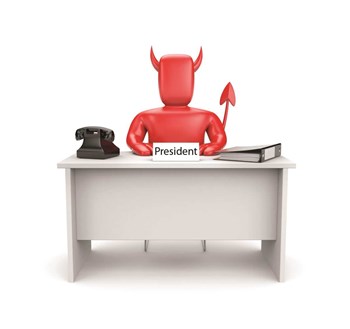
Most condo/HOA boards are made up of ordinary, well-meaning folks who volunteer for the relatively thankless job of running their association. They donate their time, expertise, and effort to make their community as functional, solvent, and harmonious as possible.
That being said, however, if you ask any management or legal pro working in the condo/HOA industry, they'll be able to tell you stories of boards and board members who were the exact opposite of all those admirable traits. Some are motivated by greed, by ego, by spite, or by the fact that they're disturbed individuals who—for whatever reason—decide that the most appealing vehicle for their brand of crazy is their condo board. The managers and attorneys unlucky enough to deal with one (or more than one) of these people on a client board can carry the post-traumatic baggage for decades.
“I’ve said this for years,” says one veteran manager. “Managing property is not that difficult. It’s either broken, or it’s fixed. It’s either growing or its dead. It either needs painting or it doesn’t. What can make this job very difficult, sometimes, is the people.”
Based on a totally unscientific poll of a small sample of management pros, here are some of the more common nefarious characters who can make both board service and management a nightmare.
The Megalomaniac
Caligula, the deranged first-century emperor of Rome, thought himself a god—and behaved accordingly. He’d feed courtiers to the lions if they didn’t respond to him with what he regarded as proper respect; he’d have his lascivious way with wives of senators; he insisted that his favorite horse be given an official title. Board members may not go around setting their enemies on fire in 2015 New Jersey, but some do carry on with pomp and circumstance as if they were heads of some despotic state.
“You have board members who just live for their board position, and feel like they should be treated like royalty,” says Steven D. Sladkus, a partner at the Manhattan law firm of Schwartz Sladkus Reich Greenberg & Atlas LLP, effective May 1. A little whiff of egomania may not be the worst thing in the world for a person in a leadership position, but if the attendant arrogance and narcissism interfere with fulfillment of job duties (and it often does), it can make life difficult for other board members and any professionals who have to deal with them.
Caligula was eventually assassinated by his own Praetorian Guard. His 2015 board member counterpart will have to just get voted off.
The One-Trick Pony
If you’ve seen it once, you’ve seen it a thousand times: a disgruntled resident runs for the board to address a single pressing issue—Paint the lobby! Allow dishwashers! Fire the super!—and then blanches in the face of actual responsibility.
“I had one board member, a woman who wanted a better playground,” says Chip Hoever, CMCA, AMS, PCAM, founder and managing partner of Somerset Management Group, LLC, a management firm based in New Brunswick. “She had a kid that she took to the playground, and the playground wasn’t terrible but it was in bad shape. And she fought to get on the board, and then once she was on, she lobbied the other board members hard to get what she wanted. And once the board voted on it and the deal was signed and the stuff was installed, the very next meeting she gave her resignation. Honestly, I don’t think the other board members realized what was going on.”
Sladkus has had similar experiences. “I’ve seen people join a board who have no interest in being on a board other than to, let’s say, fire the managing agent,” he says. “Or to further their own interests. For instance, if they’re in litigation with the building, or if they want something done for their own apartment. Unfortunately, it's not a rare occurrence.”
The Cabal
Sometimes it’s not 'someone' who comes in with an absolute agenda, but a whole group of people.
“The thing that I see very often, rather than one person as an individual, is a group of individuals,” says Wendell Smith, a partner with the law firm of Greenbaum Rowe Smith & Davis LLP in Woodbridge. “It’s politically driven. A person often runs for the board because they have their own agenda based upon them feeling ignored by the board or adversely affected by the board’s decisions. Sometimes they’ll get a group of people behind them that feels the same way, and put up candidates for the board, and it’s a 'Look what they're doing to us—throw the rascals out' mentality.”
It will surprise few to learn that money is at the root of many of these grievances, according to Smith. “More often it will be about the expenditure of funds such as a special assessment the board has determined is necessary for a replacement or renovation. A group will get together, and then they get on the board, and they’re still dissatisfied because they’re in the minority, and it can devolve into a lawsuit. And I’ve been in several situations where some board members were pitted against the others because they disagreed with an expenditure of money. They didn’t like the money being spent, so they go to court to try to stop it even though the majority of the board thought it was necessary.”
The pros say that cabals can be especially dangerous because, by involving more than one person, they are harder to dislodge, if things turn sour.
The Pugilist
Some board members like to fight—and not just with their words. To some extent, occasional flare-ups are to be expected. With so much on the line—these properties are either people’s homes, or their sources of income—tempers may get heated from time to time.
Understandable as it might be however, some board members indulge in behavior most unbecoming a grown adult, much less someone in a leadership position. “I’ve seen a lot of board members who are very easily upset, and who blow their stack when something is said to them that should never warrant such a response,” says Sladkus.
“Boards are the place where you’ll see the largest swing of emotions, because for most people, their apartment is their largest single asset,” he says. “And people get very, very emotional if something is going against the way they want it to go. Then it just depends on what each person’s personality is. There can be yellers and screamers, or there can be people who just shut down, and that’s how they deal with controversy.”
And some people solve problems—or try to—with their actual, literal fists. “I’ve seen board members who fight with other board members just because they like to fight,” says one manager. Violence, needless to say, is not the best way to get the job done.
The Autocrat
When Harry Truman became president after the death of Franklin Delano Roosevelt, his first order of business was to be briefed on the war. As the vice president, he had been completely out of the loop; FDR had not bothered to tell him anything.
Some board presidents operate a lot like FDR with respect to the other board members.
“I had this really hot deal on the hook for getting a new, good-sized association in the area,” recalls Hoever. “I invited the president out to breakfast, and we meet at a diner, and the first thing he says it that he doesn’t eat breakfast. So I go through my sales pitch, and he was seemingly very interested, and it was sounding really good, and then we start talking about maintenance issues. He said, ‘I run the maintenance of the site. I will tell you when there’s a problem that needs to be fixed, I will tell you who to use, I will approve the bills and give them to you, you will cut checks and give them back to me. I will sign the checks and hand them out to the vendors.’”
Needless to say, Hoever was taken aback. “I know what any of my auditors would say to me if I went to any of them with that kind of scenario,” he says. “So this is one of those times that I had to say, ‘I’m sorry, that’s not the way we do business.’ I unsold the deal, and we moved on.”
This sort of autocratic behavior may be perfectly innocent, but in addition to giving the appearance of impropriety, which is almost as bad as the real thing—it opens the door to many opportunities for shady dealings. It's also impractical. While too many cooks may spoil the soup, having only one cook who knows the recipe is equally problematic; if he or she is out of town, ill, or otherwise unreachable, day-to-day community business can grind to a halt when nobody knows anything about how the building or association is actually run, or how to get access to that information.
The Busybody...and the Pervert
Retirees frequently serve on boards, and are often among the best board members. They bring a long resume, years of life experience, and that most precious quality, free time. Sometimes, unfortunately, the same qualities that make retired residents excellent board members can also make them a bit overzealous.
“One retired gentleman I’ve worked with,” says Hoever, “I cannot tell you how many emails I got from him when he was the board president. I told him in all honesty that I got more emails from him than from all my other board members combined. And he was demanding immediate responses.”
Other managers have told tales of board presidents lurking behind potted plants in the lobby—literally!—to spy on residents, and then reporting back to the manager, as if said manager were a CIA station chief.
All this having been said, a good manager will find a way to work with a difficult board member—at least until their fellow board members and residents have had quite enough and vote them off—but there's one miscreant left on the list, and he (or she) is the worst of all.
The Crook
Boards are in charge of an awful lot of money. They are involved with collecting maintenance fees and other dues, doling out work contracts, and hiring and firing employees. Power may not always corrupt, but it can certainly be tempting.
Financial mismanagement could be taken to drastic levels, especially during the recent recession. “I had one board president who owned two apartments in a condominium,” says one area management professional. “One she rented out for profit, and one she lived in. Finally the management team came to someone else on the board and explained that she, the board president, was in significant arrears on both apartments. But the management company had been instructed by the board president not to include her on the monthly arrears reports that the board was getting at the monthly meetings. So the board didn’t know about it. That was a doozy. Here you have someone who is making financial decisions on behalf of the building, who isn’t meeting her own financial obligations to the building and telling management not to include her on the arrears report. That created a tremendously difficult situation, and she was obviously removed as president as soon as it came out.”
Even in the worst of times, board members are volunteering their time and energy, and performing a service. Even the nasty ones. And one thing the folks we spoke with all agreed on: it’s not the board members who present the real “people” challenges. “I’ve been doing this about 20 years, and most of my war stories are with regard to non-board members, the people that I’ve represented the board in dealing with,” says one professional.
...But that's another story for another day!
Greg Olear is a freelance writer and a frequent contributor to The New Jersey Cooperator.






Comments
Leave a Comment